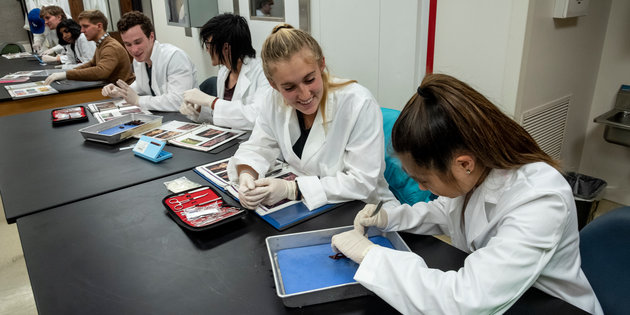Lab Experiences for Online Classes

Lab-based courses typically require specialized equipment and supplies, making them among the most difficult types of courses to transition into an online format. Indeed, some lab activities may be impossible to fully translate into an online or asynchronous space. Nevertheless, when circumstances make remote instruction mandatory, strategies are available that may work for some courses.
As you consider how you might deliver lab-type experiences on time, please focus on your course's learning outcomes. Those outcomes will determine what types of online experiences you might consider, and how adequate those experiences may be.
Tools and Techniques for Teaching Experimental Protocols
For lab experiences that primarily address learning outcomes related to developing students' skill implementing experimental protocols, digital simulations may allow you to meet or at least approach those objectives. Websites that provide virtual laboratories in which students may simulate experiments and demonstrations include:
- APA Online Psychology Laboratory for psychology
- ChemCollective for chemistry
- HHMI BioInteractive for biological sciences
- LabXchange (at Harvard) for multiple disciplines
- MERLOT for multiple disciplines
- Next-Gen Molecular Workbench and Classic Molecular Workbench for chemistry, physics, and biology
- PhET (at the University of Colorado Boulder) for multiple disciplines at the K-12 through college levels
If there are no suitable options for virtual labs, you may be able to find a video recording of appropriate lab procedures in the Journal of Visualized Experiments. Volumes 1 (2006) through 140 (2018) are publicly available on the PubMed website. Other venues such as Khan Academy or even YouTube may include recorded experiments or procedures like dissections. Of course, you also have the option of filming yourself performing an experiment and providing that video to students.
Viewing such materials need not be passive experiences for your students. By dividing videos into sections, you can interleave activities like hypothesis formation, or ask students to justify the recorded experimenters' methods and procedures. You could even ask students to write up lab reports in a "role playing" mode, as if they were part of the team conducting the recorded experiment.
Techniques for Teaching Data Analysis
If the primary learning outcome the lab experiences address has to do with data analysis rather than data collection, consider providing the students with realistic data sets upon which to perform the required analysis. Video-recorded experiments from the aforementioned sources could also provide raw data in a less processed form. Alternately, you could assign students to read published reports and justify or critique the data analysis reflected there.
Techniques for Cultivating Long-Term Projects
Lab classes that engage students in semester-long projects will likely prove the most difficult of all to migrate into a remote teaching modality. In many such courses, your students will already have been working on their projects for several weeks before being separated from the facilities, equipment, and materials they need to bring those projects to completion. In some cases, students may be able to produce a subset of the project originally envisioned, by focusing on the data they have already collected and giving detailed descriptions of what their next experimental or investigative steps would have been, given appropriate physical resources. You might even be able to re-envision the culminating deliverable. For example, if you intended for students to report their results in a publishable journal article, but they cannot now complete that task due to lack of laboratory access, perhaps you could revise the assignment into a grant proposal supporting the additional research that would be needed to complete the project.
The bulk of this webpage is adapted, with permission, from guidance offered by Martin Samuels at Harvard University's Derek Bok Center for Teaching and Learning. Thanks also to Tom Vandergon for reviewing the page and making helpful suggestions.